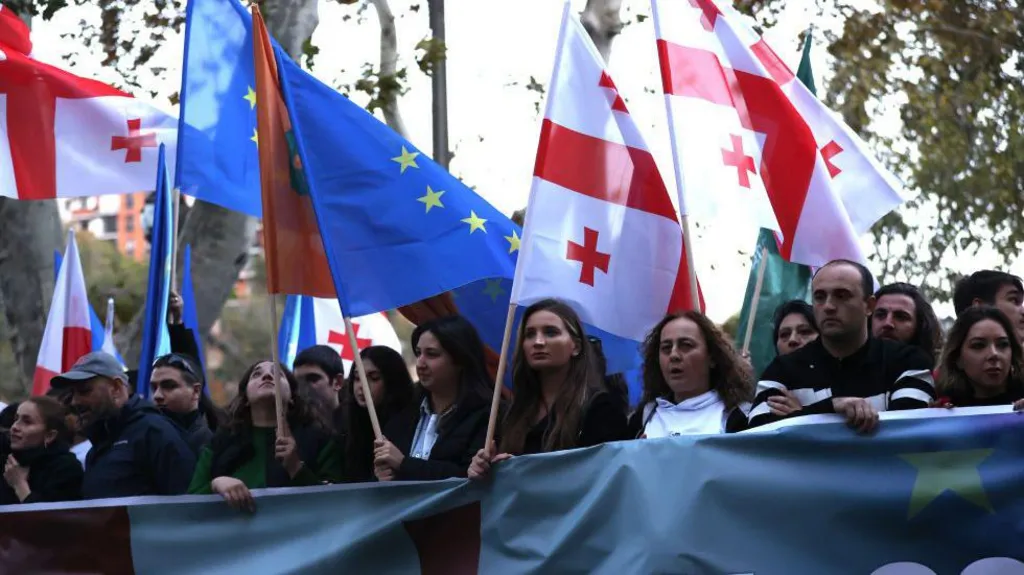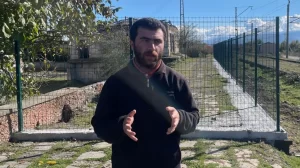Tense Election Looms for Georgia’s European Future
3 min read
An estimated 80% of Georgians are thought to support their country joining the EU

An estimated 80% of Georgians are thought to support their country joining the EU
Georgians are all too familiar with the harsh realities of war with Russia. Before the invasion of Ukraine, Russia launched a brief but devastating conflict in August 2008. The city of Gori faced bombing and occupation, while battles in Shindisi destroyed infrastructure and left deep scars on the land and its people.
As the country heads into a pivotal election on Saturday, opposition groups are framing the contest as a choice between aligning with Russia or pursuing a path toward Europe. Their goal is to end the 12-year rule of the governing Georgian Dream (GD) party, which they accuse of veering back into Russia’s sphere of influence and stalling Georgia’s EU membership aspirations.
“In these streets, we had Russians,” says Mindia Goderdzishvili, who leads the campaign for the opposition Coalition for Change in Gori. “The government exploits these memories to maintain power.”
In response, GD and its influential billionaire founder, Bidzina Ivanishvili, vehemently reject this characterization. They position themselves as the party of peace, claiming that the opposition, backed by an unspecified “global war party,” seeks to embroil Georgia in conflict.
Nearby, the graves of 17 Georgian soldiers stand as a solemn reminder of the sacrifices made to defend the region. Just beyond lies South Ossetia, one of two breakaway territories still under Russian military control. “I don’t think anybody can guarantee Georgia’s security today,” states Maka Bochorishvili, head of Georgia’s EU integration committee. “We are not NATO members, and the last war was not long ago.”
While Georgian Dream continues to pledge EU membership by 2030, the credibility of this promise has waned, particularly as the EU has frozen the accession process due to a controversial law targeting “foreign influence.” This legislation threatens to undermine various media and civil society organizations, raising alarms about democratic backsliding.
Adding to concerns, a recent law that restricts LGBT rights and reports of voter intimidation have prompted EU Ambassador Pawel Herczynski to express that “instead of getting closer, Georgia is moving away from the European Union.”
On the eve of the election, financial police conducted raids on the homes of two researchers affiliated with the US-based Atlantic Council, sparking further outcry. The Prime Minister suggested these searches “might uncover something interesting,” raising fears about governmental overreach.
Pro-Western President Salome Zourabichvili has publicly urged Georgians to support the opposition, which backs her proposal for a one-year technocratic government should they win. The election has increasingly centered around Ivanishvili, often considered the mastermind behind the ruling party.

Ivanishvili has vowed to ban the United National Movement (UNM), the largest opposition party, citing their past actions while in power. With the former UNM leader, Mikheil Saakashvili, currently imprisoned, the ruling party aims to target not just this faction but potentially extend its ban to other opposition figures as well. However, achieving such a sweeping victory seems unlikely, as the opinion polls are notoriously unreliable.
During his campaign visit to Gori, Ivanishvili offered an apology for the 2008 war, blaming Saakashvili’s administration rather than acknowledging Russian aggression. At the final campaign rally in Tbilisi, he reiterated his claims against the UNM, which could discourage voters from supporting alternative parties.
For many like Aleksandre, a 30-year-old voter in Shindisi, Ivanishvili’s narrative feels disconnected from reality. “The idea that Saakashvili started the war is absurd,” he says. Many of his peers have left the region in search of better opportunities. He believes the government should focus on revitalizing local infrastructure, such as the railway, and safeguarding Georgian lands from Russian encroachment.
Russia has openly shown its preference for Georgian Dream, with claims from the Kremlin’s SVR intelligence service suggesting the US is plotting a “Ukraine-style” upheaval to prevent GD from securing a fourth term. While the SVR provided no evidence for this claim, the rhetoric reflects Moscow’s interest in Georgia’s political dynamics.
Georgia’s historical connection to Russia is complex. While some locals still hold nostalgia for the Soviet era, many have moved on and now seek a future within the European Union. The broad consensus across Georgia is a desire for EU integration, though uncertainty remains about which political forces will best facilitate that goal. As the election approaches, the stakes have never been higher for Georgia’s aspirations on the European stage.